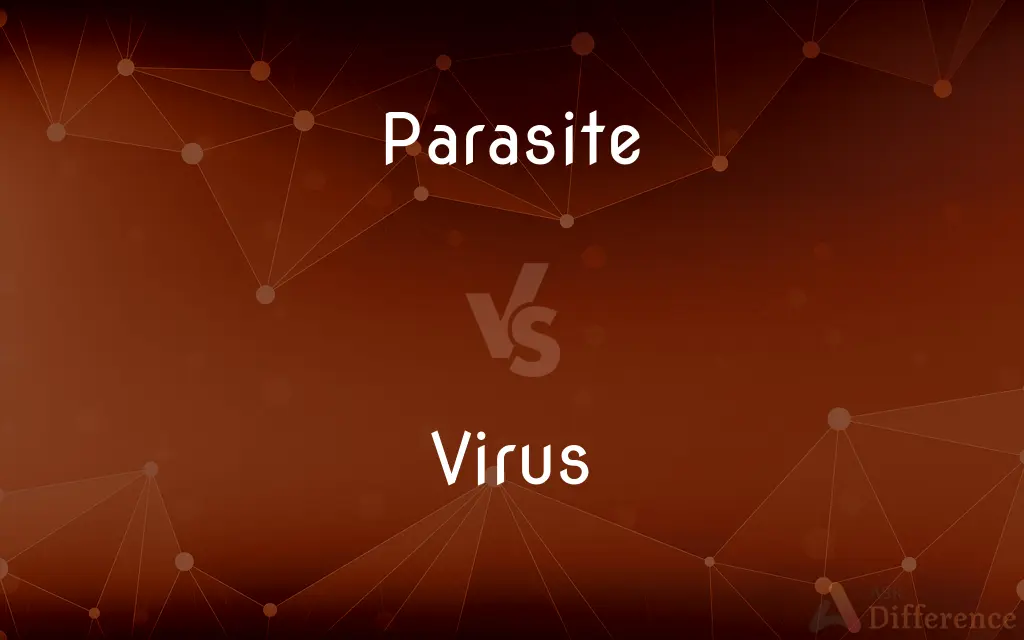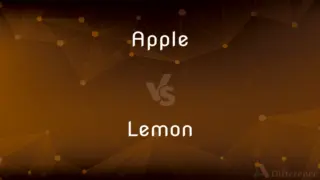Parasite vs. Virus — What's the Difference?

Difference Between Parasite and Virus
ADVERTISEMENT
Compare with Definitions
Parasite
(Biology) An organism that lives and feeds on or in an organism of a different species and causes harm to its host.
Virus
A virus is a submicroscopic infectious agent that replicates only inside the living cells of an organism. Viruses infect all life forms, from animals and plants to microorganisms, including bacteria and archaea.
Parasite
One who habitually takes advantage of the generosity of others without making any useful return.
Virus
Any of various submicroscopic agents that infect living organisms, often causing disease, and that consist of a single or double strand of RNA or DNA surrounded by a protein coat. Unable to replicate without a host cell, viruses are typically not considered living organisms.
Parasite
One who lives off and flatters the rich; a sycophant.
ADVERTISEMENT
Virus
A disease caused by a virus.
Parasite
A professional dinner guest, especially in ancient Greece.
Virus
A computer program or series of commands that can replicate itself and that spreads by inserting copies of itself into other files or programs which users later transfer to other computers. Viruses usually have a harmful effect, as in erasing all the data on a disk.
Parasite
(pejorative) A person who lives on other people's efforts or expense and gives little or nothing back.
Virus
A harmful or destructive influence
The pernicious virus of racism.
Parasite
(pejorative) A sycophant or hanger-on.
Virus
A submicroscopic, non-cellular structure consisting of a core of DNA or RNA surrounded by a protein coat, that requires a living host cell to replicate, and often causes disease in the host organism; such agents are often classed as nonliving infectious particles and less often as microorganisms.
Parasite
(biology) An organism that lives on or in another organism of a different species, deriving benefit from living on or in that other organism, while not contributing towards that other organism sufficiently to cover the cost to that other organism.
Lice, fleas, ticks and mites are widely spread parasites.
Virus
(uncountable) A quantity of such infectious agents
Parasite
A climbing plant which is supported by a wall, trellis etc.
Virus
A disease caused by such an infectious agent; a viral illness.
He's got a virus and had to stay home from school.
Parasite
(historical) A retainer or companion of an ancient Celtic warrior, who praised him in song or poetry at gatherings; a bard.
Virus
(archaic) Venom, as produced by a poisonous animal etc.
Parasite
(aviation) A component of a composite aircraft which is carried aloft and air-launched by a larger carrier aircraft or mother ship to support the primary mission of the carrier.
Virus
(computing) A type of malware which can covertly transmit itself between computers via networks (especially the Internet) or removable storage such as disks, often causing damage to systems and data; also computer virus.
Parasite
One who frequents the tables of the rich, or who lives at another's expense, and earns his welcome by flattery; a hanger-on; a toady; a sycophant.
Thou, with trembling fear,Or like a fawning parasite, obey'st.
Parasites were called such smell-feasts as would seek to be free guests at rich men's tables.
Virus
Any type of malware.
Parasite
A plant obtaining nourishment immediately from other plants to which it attaches itself, and whose juices it absorbs; - sometimes, but erroneously, called epiphyte.
Virus
(figurative) Any malicious or dangerous entity that spreads from one place or person to another.
Parasite
An animal which lives during the whole or part of its existence on or in the body of some other animal, feeding upon its food, blood, or tissues, as lice, tapeworms, etc.
Virus
To send or infect an electronic device with a computer virus.
I'm just going to virus anyone who tries cheating on this game.
Parasite
An animal or plant that lives in or on a host (another animal or plant); the parasite obtains nourishment from the host without benefiting or killing the host
Virus
Contagious or poisonous matter, as of specific ulcers, the bite of snakes, etc.; - applied to organic poisons.
Parasite
A follower who hangs around a host (without benefit to the host) in hope of gain or advantage
Virus
The causative agent of a disease, .
Virus
Any of numerous submicroscopic complex organic objects which have genetic material and may be considered as living organisms but have no proper cell membrane, and thus cannot by themselves perform metabolic processes, requiring entry into a host cell in order to multiply. The simplest viruses have no lipid envelope and may be considered as complex aggregates of molecules, sometimes only a nucleic acid (DNA or RNA) and a coat protein. They are sometimes viewed as being on the borderline between living and nonliving objects. They are smaller than living cells in size, usually between 20 and 300 nm; thus they pass through standard filters, and were previously referred to as filterable virus. The manifestations of disease caused by multiplication of viruses in cells may be due to destruction of the cells caused by subversion of the cellular metabolic processes by the virus, or by synthesis of a virus-specific toxin. Viruses may infect animals, plants, or microorganisms; those infecting bacteria are also called bacteriophages. Certain bacteriophages may be non-destructive and benign in the host; - see bacteriophage.
Virus
Fig.: Any morbid corrupting quality in intellectual or moral conditions; something that poisons the mind or the soul; as, the virus of obscene books.
Virus
A program or segment of program code that may make copies of itself (replicate), attach itself to other programs, and perform unwanted actions within a computer; also called computer virus or virus program. Such programs are almost always introduced into a computer without the knowledge or assent of its owner, and are often malicious, causing destructive actions such as erasing data on disk, but sometime only annoying, causing peculiar objects to appear on the display. The form of sociopathic mental disease that causes a programmer to write such a program has not yet been given a name. Compare trojan horse{3}.
Virus
(virology) ultramicroscopic infectious agent that replicates itself only within cells of living hosts; many are pathogenic; a piece of nucleic acid (DNA or RNA) wrapped in a thin coat of protein
Virus
A harmful or corrupting agency;
Bigotry is a virus that must not be allowed to spread
The virus of jealousy is latent in everyone
Virus
A software program capable of reproducing itself and usually capable of causing great harm to files or other programs on the same computer;
A true virus cannot spread to another computer without human assistance
Share Your Discovery

Previous Comparison
Apple vs. Lemon
Next Comparison
Valorisation vs. Valuation














































